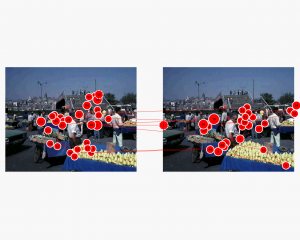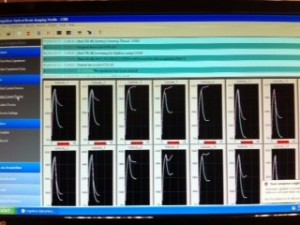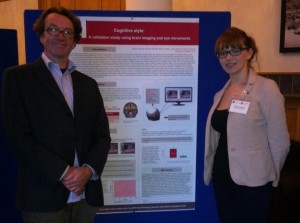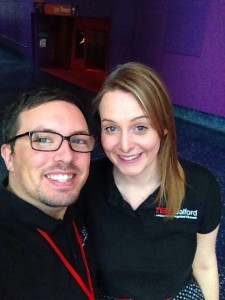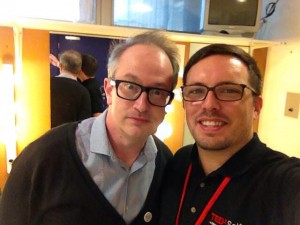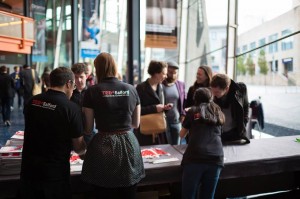The team of psychologists (Simon Cassidy, Rob Bendall, Lynne Marrow and Adam Galpin), based in the Directorate of Psychology and Public Health, will be working with student intern Sarah Lambert. Sarah has recently completed her second year on the BSc Psychology (Hons) programme and will be spending the summer working on a project investigating brain imaging and eye-movements as markers of cognitive style. Sarah will be posting here regularly to keep you up to date with her experiences as an intern.
#1 – The experiences of a Psych intern….
So the first day of my BPS Psychobiology Summer Internship arrived and I had no idea what to expect. To my utter relief I was not ordered to stand up and recount an in depth analysis of cognitive style and biological markers, whilst drafting a detailed sketch of the anatomy of the brain. Nor have I been sent to fetch cups of tea or deliver dry-cleaning. Thanks to the support and reassurance I’ve received from my supervisors, my apprehension has been overshadowed by excitement, and I am thoroughly enjoying my first week as an intern.
My highlights of the week so far include one-to-one training sessions with Rob Bendall on building cognitive experiments in E-Prime (its easy once you know how!), literature searching and a very very handy tutorial from Roy Vickers on how to get the best out of SOLAR.
I’ll be sure to post regular updates of my ongoing experiences and hopefully give you a glimpse of what it’s like taking the first steps into the exciting world of psychological research.
#2 – The experiences of a Psych intern….
So here’s where it gets really interesting! This week I’ve been introduced to the lab and the impressive experimental setup that Rob Bendall has created. My initial thought was “this looks incredibly complicated and very expensive – don’t touch ANYTHING”. And a complex system it is. Simultaneously gathering data from eye-tracking, fNIRS brain imaging and E-Prime software, the set-up relies on an extraordinary amount of technology to ensure the experiment runs smoothly. The test data extracted during training sessions, although not relevant to the study, personally makes for interesting viewing.The very fact that internal processes can be converted into visual representations still amazes me.
Additional tasks this week have included finalising posters and information sheets in preparation for recruitment and drawing up the first draft of the abstract. This has been an education in itself. It’s surprisingly difficult to prepare an abstract without any preliminary data, but I am assured that if I pursue a career in psychological research that this will not be the first and last time I’m in this predicament!
With the help of my co-researchers and some very patient guinea pigs I’ve managed to (almost) master the experimental procedure and I’m keen to get this show on the road. We finally have confirmation of ethical approval and so recruitment can start in earnest. Next stop data collection…………… Look out for posters around the psychology Directorate if you want more information on the study of would like to participate.
#3 – The experiences of a Psych intern
Only three weeks in to the project my position as an intern has taught me more than I ever could have imagined. I began my journey excited at the prospect that this experience was going to be fantastic opportunity to learn more about the mechanics of a research project. On reflection, my initial focus was how lucky I was to have one-to-one training on the lab equipment, and I was eager to learn more about brain imaging and eye-tracking. I didn’t realise that it would offer me something much more valuable – the chance to glimpse into the future and define my own career aspirations. From literature searching, data collection, writing, planning and networking – I’m thoroughly enjoying the variety of my role.
There is now no doubt in my mind that my future will be solidly grounded in research. Hopefully this blog will give me the platform to not only share my experience, but to show students the opportunities that are out there for us all.
As a student you are forever told to go out and get some work experience or engage in voluntary work “because it will look fantastic on your C.V. “. Of course it will give you the edge, but there is a more important and more pressing reason that you should consider stepping out of your comfort zone and gaining some work experience. Your journey through higher education and ultimately the career path you subsequently follow is determined by decisions you make – equip yourself the best way you can by learning what it is that you actually enjoy. Work experience is more than gaining an advantage over other graduates – it’s an opportunity to discover your own strengths and find the career path that is right for YOU. Whether your interests lie in psychological research, mental health, counseling or the criminal mind, there are opportunities to suit everybody. You just have to find them.
#4 – Experiences of a Psych intern…
Data collection is well underway and I’m beginning to get a real taste of what a career in research would entail.
My schedule is getting progressively busier as data collection, data analysis and poster preparation are all in progress, and my organisational skills are truly being put to the test. The process of data collection has been a rewarding, informative and at times even a frustrating experience. I get a certain satisfaction from each and every successful appointment, knowing that the success of the project hinges on gathering reliable data. I can’t help but take it personally when equipment failures interfere with my quest to collect useable data! These technical hitches (although maddening) are part and parcel of the experimental process – particularly when working with a very technologically heavy set-up. However, I’ve found that looking forward, I am no longer fazed at the prospect of conducting future experiments. The knowledge I have gained has given me the confidence in my own troubleshooting abilities and provided me with an incredibly valuable experience. Preliminary data screening also began this week, with training sessions on how to extract the useful data and filter out what we don’t need. As a novice this allows me to observe how the data may be mentally analysed and applied to the topic as the project goes on. For instance, whilst ‘sense’ checking the eye-tracking data Adam Galpin explained how reading the raw data and ‘sense’ checking not only helps avoid errors occurring, but can reveal interesting details about the nature of the information contained in the output. This initial analysis provides a clue as to what variables may be of interest and indicates the direction that analysis may take. These regular meetings with the team allow me to witness the thought processes of the researchers and see how decisions and conclusions are made. This has undoubtedly been the most valuable aspect of my internship. It is here that the true value of my position as an intern becomes glaringly obvious. The beauty of collaborative work is that each contributor brings their owns strengths to the table. I’m extremely lucky to be seated at that table and have the combined knowledge of four researchers as an available resource.
#5 – The experiences of a Psych intern….
Focus has now shifted onto extracting, converting and analysing data. All the work of the previous four weeks is culminated into these masses of figures on a spreadsheet. I am still amazed at how individual disposition and behavioural responses can be converted into visible and usable statistics. This is where we discover the direction the analysis will take. In reality, the process of analysis is somewhat different to what is taught during research methods lectures and seminars. I was unaware that the preparation, screening and filtering of data was quite so complex and time-consuming. To give you an indication of the magnitude of this task, for this project the extraction of the eye-tracking data first requires all short fixations to be manually removed, saccade (eye-movement) length and direction need to be calculated, and the position and type and of eye-movement deciphered. This process needs to be completed for each and every experimental trial before we can even begin to extract any meaningful data. So in short, if there are 30 participants and 20 experimental trials…..that means this procedure must be repeated 600 times! Only then can the actual analysis begin.
As you can imagine, I’m becoming quite the excel expert!
In addition to extracting eye-tracking data, this week work has started on filtering and analysing the fNIRS brain imaging output. I can’t help but be slightly amused by Rob’s catchphrase of “this is how I do it, but you’ll find your own way”. This is usually the point when I come to the realisation that I am responsible for doing this task on my own. As daunting as this is I am given all the tools and guidance I need, and again, this is where my confidence in my own abilities is beginning to grow. Once I have nailed the actual process I find that it is much easier to understand the concept of the analysis. You see, it’s not just the actual process of hitting the right buttons and learning what goes where, but grasping the theory of why. This is precisely what psych research is about –interpreting the results, identifying possible variables of interest and the application of this information. Thanks to the descriptive manner of the research team not only am I gaining the knowledge of how to conduct ‘real life’ statistical analysis, but I’m quickly learning the theory behind the process.
#6 – The experiences of a Psych intern….
The research poster is finally complete and encompasses all the hard work of the previous few weeks. It’s enormously satisfying to view the finished product and certainly a very proud moment to see my name amongst the other researchers – proof that I have indeed contributed to the composition of the project! The very fact that there have been four other contributors that have been readily available for advice and feedback gives me secure confidence in the content and presentation of the poster. However, although this is reassuring, I must admit that the most stressful element of the entire internship has been my own determination to meet the expectations of the other researchers! All that remains is to present the research poster at the BPS Annual Psychobiology Section Scientific Meeting next week – rest assured, I will let you know how I get on.
Through my time here, I have come to the conclusion that psychological research is often misconstrued and the fear of statistics or the dreaded SPSS tends to put many undergraduate students off pursuing a research career. In truth, statistics only play a small role in a research project – a small role but essential role nonetheless. The basis of any research project is the theoretical reasoning and formation of the research question – stats simply provide you with your indicative result. As a novice you don’t need to be able to recite the ANOVA formula or navigate seamlessly through the SPSS program. You don’t even need to like statistics! What is important however is being able to understand the output, how it applies to your research question and what this means in real life terms.
So my internship has officially come to an end…but they won’t get rid of me that easily. I’ve enjoyed my time here so much and I’m gaining so much knowledge that I’m continuing to work on the project along with the current research team. The opportunity to learn is still very much accessible and I am very thankful that I am still made to feel so welcome. I’m very aware of just how fortunate I have been to have not only have been awarded the BPS psychobiology section internship, but to have such positive and engaging role models as mentors. My time here within the research department has been an educational experience, offering me the chance to expand my knowledge and gain a real taste of the research environment. I’m immensely grateful to the research team (Simon Cassidy, Rob Bendall, Adam Galpin and Lynne Marrow) for finding the perfect balance between supervision, issuing responsibility and allowing me to follow my own initiative. This is undoubtedly what has made this journey such an enriching experience. I must also give a special mention to the rest of the Psychology and Public Health department. It has been an absolute pleasure to work within such a welcoming and sociable environment. Surrounded by the discussion of current projects and exchanging of ideas, my dedication to pursuing a research career has only been reinforced by witnessing the sheer passion and apparent enthusiasm of the entire department. Thank you!
#7 – The experiences of a Psych intern….
A prerequisite of the internship award was that I must attend the Annual BPS Psychobiology Section Annual Scientific meeting and present the findings of the project in the form of a research poster. Although I was eager to stand beside the poster that was a single representation of all the hard work of the previous three months, I do not mind admitting that I did have reservations over my ability to deliver an engaging and coherent account of the research study. Understandably, my apprehension was centered around the potential questioning that may be directed my way. What if I don’t know the answer to a question? Or maybe I wouldn’t even understand the question! My initial fears were quashed once I arrived at the venue, finally found a prominent spot to display my poster and became acquainted with the other attendees. Realistically, after spending a good twelve weeks immersing myself in the research project I found I could find a confident response to any questions fired at me. That being said, all questions were delivered in a positive manner, and were based on genuine interest in the methodology and results of the study. Trust me when I say – nobody is there to publicly humiliate you! It was fantastic to receive such positive feedback and personally a really rewarding experience. I must admit once the poster session was finished (and I’d survived!), it was nice to be able to circulate and discover the varied journeys that had led researchers to the paths they had chosen. It was a great opportunity to steal some valuable hints and tips! The Psychobiology Scientific conference offered a perfect relaxed and friendly introduction into the psychresearch domain, and is one that I look forward to attending again next year. I’d strongly urge others tojoin the BPS and make use of these external events to learn, connect, and above all, build their own confidence.
Sarah Lambert with Dr Richard Stephens
(Chair of the BPS Psychobiology Section)

